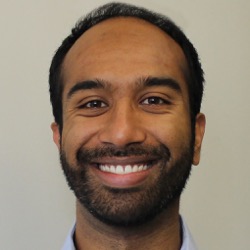Dr. Gaurab Basu shares his thoughts on how learning about community health initiatives benefit residents as well as the communities they serve
Dr. Gaurab Basu is a primary care physician at the Cambridge Health Alliance, who hopes to change the way new doctors feel about residency. Gaurab is currently working on a medical education fellowship, teaching a community health advocacy class to residents. “Residency is a really stressful time,” he says, “Studies have shown that for many people, their idealism, motivation, and connection to their values decreases significantly.”
In the past, Gaurab’s course has covered topics that residents were especially interested in studying, including health insurance reform. He has also covered topics such as community health for specific populations, including prison health. “In the course, we teach residents about how they are in a strong position to inform the national discussion,” he says.
The course, we hope, helps residents reconnect with their values and remind themselves of why they got into medicine in the first place.
“We take field trips to different parts of Boston and introduce residents to speakers who are doing interesting work,” says Gaurab. “Even though residency may be stressful now,” he says, “learning about community health advocacy reminds residents that in the near future, they can be doing some pretty exciting work.”
Why should residents get involved in community health advocacy?
Gaurab emphasized that those who provide clinical care have a unique voice in community health advocacy. “Physicians, nurses, and physicians assistants are all involved,” he says, “When you provide clinical care to a patient, you see people’s lives very authentically. They open up to you. They trust you. It’s a pretty profound connection you have with them.”
Learning about community health advocacy reminds residents that in the near future, they can be doing some pretty exciting work.
“Because of our special vantage point, we’re in a really powerful position to articulate issues that patients are experiencing,” Gaurab says. Gaurab’s course, in part, aims to train residents to describe the patient’s perspective and the patient’s needs well in order to affect community change. “I think it’s important for physicians to engage with their communities, and to do their part in trying to improve people’s quality of life. Taking into account how mentally and physically vulnerable patients are, it is a challenge to improve their lives within one clinical care visit. That’s why public health interventions should happen more regularly.” Gaurab feels that adding the community health perspective to one’s residency can orient residents towards their mission as medical professionals.
“The course, we hope, helps residents reconnect with their values and remind themselves of why they got into medicine in the first place,” says Gaurab.





